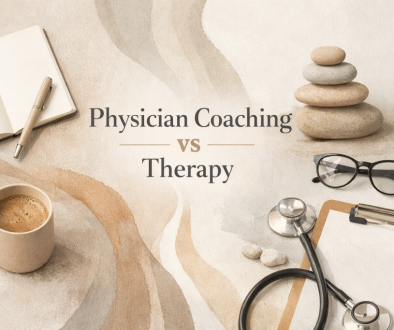A Real-World Guide for First Year Attending Physicians
So You’ve Made It—Now What? A Real-World Guide for First-Year Attendings
The Dream Job Feels… Heavy
The white coat fits. Your name badge finally says “doctor.” And yet—there’s this unexpected weight. Not from the hours (you’ve done worse), and not from imposter syndrome (you made it). It’s something else.
You’re in the middle of an expected physician career transition, and what no one tells you is just how disorienting this leap from resident to attending can feel.
You’re not alone.
Nearly two-thirds of physicians report symptoms of burnout, and some of the highest risk comes after training ends—when you’re handed autonomy, responsibility, and no roadmap for what comes next.
So if you’re wondering, “Is it supposed to feel this way?”—yes.
And also: there’s a better way forward.
Why This Transition Is So Hard (and So Misunderstood)
We talk a lot in medicine about moving from pre-med to med school, from student to resident. Each transition is marked by rituals, structure, and mentorship.
But the shift from trainee to independent physician? It’s more like: “Congrats, you’re on your own. Good luck.”
Residency comes with guardrails. Even if you’re running on fumes, someone’s always co-signing your orders. Attendings carry the final say.
But now? You are the final say.
“In residency, I stayed up late studying. Now, I stay up wondering if I made the right call. The pressure is quieter, but deeper.”
—Pediatric hispitalist
It’s not just a change in role. It’s a full identity shift. And like any major transition, it comes with turbulence.
Three Things Every New Attending Should Know
1. It Doesn’t Get Easier
A lot of residents think: Once I’m done with training, I’ll finally breathe.
Here’s the truth: independent practice is less micromanaged, but it’s not necessarily easier. It’s just different.
The hours may look better on paper, but now everything falls to you—documentation, billing, patient safety, clinical decisions, end-of-life conversations, and sometimes staffing logistics.
“I expected freedom. What I got was ownership. I wasn’t prepared for how that would feel.”
— Emergency Physician
That ownership can be empowering and isolating.
2. The Learning Doesn’t Stop. It Shifts Gears
One of the biggest shocks? You may find yourself studying more than during residency.
But now it’s not for exams. It’s because every decision matters.
Clinical questions become real-time, high-stakes puzzles. Guidelines evolve. Cases get more complex. There’s no attending to double-check your gut.
“I look things up constantly now. It’s not about proving I’m smart—it’s about doing right by my patients.”
— First Year, Internist
This is why many new attendings feel imposter syndrome. It’s not about being unqualified—it’s about realizing the learning never stops.
3. Your Most Important Skill? Learning to Say No
During training, you said yes to everything:
- Extra shifts
- Committee meetings
- The presentation no one wanted to give
But that mindset doesn’t serve you well as an attending.
Boundaries aren’t a luxury, they’re a survival tool.
Saying no might look like:
- Not joining that “optional” task force
- Protecting your day off
- Capping your patient panel before it becomes unsafe
It’s not selfish. It’s self-preservation.
Ironically, saying no is what allows you to say a wholehearted yes to what matters most: your patients, your growth, your life outside of medicine.
When Growing Pains Become Burnout
There’s a difference between a hard season and something more serious.
Ask yourself:
- Are you emotionally exhausted, not just tired?
- Have you become cynical or withdrawn?
- Do you dread going to work—even when rested?
- Are you thinking about leaving medicine entirely?
If so, it’s time to pay attention. You don’t have to crash before you course-correct.
“I thought burnout was for older doctors. I thought I was just adjusting. But eventually, I couldn’t hide it—not from my patients, and not from myself.”
— Family Physician
Burnout in early-career physicians is real. And it’s not a personal failure, it’s a signal.
So… Should You Leave Medicine?
Not necessarily.
For some, the right move might be exploring nonclinical careers like:
- Healthcare consulting
- Industry roles
- Medical education
- Digital health
But for many, it’s not medicine itself that’s broken, it’s how we’re practicing it: without boundaries, community, or support.
If you’re unsure whether to change jobs or leave entirely, don’t do it alone.
How Physician Coaching Can Help Physician Career Transition
Professional coaching offers the clarity you didn’t get in training.
Where therapy looks back, coaching looks forward:
- What do you actually want from your career.
- What’s working—and what’s not?
- What do you need to change in order to thrive?
Coaching provides structure, accountability, and perspective.
“I didn’t need to quit medicine. I needed to learn how to live it differently.”
— Dr. Lisa Thompson, Internist
Sometimes you don’t need an exit plan. You just need someone to walk beside you while you figure things out.
Trends Shaping Today’s Physician Career Transition
This generation of doctors is navigating more than just personal growth—we’re riding a wave of systemic change:
- Tech Everywhere: From telehealth to AI, the learning curve keeps climbing.
- Value-Based Models: You’re not just treating patients—you’re proving outcomes.
- Work-Life Rebellion: Younger physicians are pushing back on toxic work norms.
- Geographic Gaps: Physician shortages create both opportunity and overload.
Awareness of these shifts helps you lead your career—instead of feeling dragged by it.
Resilience Isn’t Grit—It’s Adaptability
Want to thrive in this season? Focus on what actually builds resilience:
- A growth mindset: You’re not failing—you’re learning new terrain.
- A support system: Community is a buffer against burnout.
- Self-compassion: You don’t have to be perfect to be worthy.
- A long view: One bad rotation—or year—doesn’t define your calling.
- Professional support: Coaches, mentors, and therapists aren’t last resorts—they’re lifelines.
The Takeaway: You’re Not Broken—You’re Becoming
Every physician hits a wall at some point. But the attending transition wall? It’s especially tall, especially quiet, and especially common.
The doctors who move through it best aren’t the ones who “tough it out.” They’re the ones who pause, reflect, and ask better questions:
- What kind of physician do I want to be?
- What support do I need?
- What matters more to me now than it did before?
If you’re in this moment—you’re not failing. You’re evolving.
And you don’t have to do it alone.
Need Support for Your Physician Career Transition?
You’re not just building a career. You’re building a life.
If the transition to independent practice feels heavier than expected, it might be time to get some clarity and support.
At The Developing Doctor, Dr. Ben Reinking offers coaching tailored to the real challenges of early-career physicians—from burnout to boundaries, from identity shifts to new possibilities.
Visit The Developing Doctor to learn more and take your next step.





